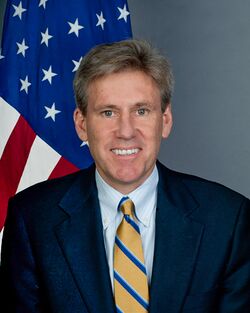Difference between revisions of "Ambassador/Libya"
m (Robin moved page Ambassador to Libya to Ambassador/Libya: Text replacement - "Ambassador to " to "Ambassador/") |
(unstub) |
||
| Line 1: | Line 1: | ||
{{concept | {{concept | ||
| − | |wikipedia= | + | |wikipedia=https://en.wikipedia.org/wiki/Category:Foreign_relations_of_Libya |
| − | |||
|constitutes=ambassador | |constitutes=ambassador | ||
|interests= | |interests= | ||
| + | |image=Ambassador christopher stevens.jpg | ||
| + | |image_caption=[[John Christopher Stevens]] was US Ambassador from May 22, 2012 to September 2012, who was [[2012 Benghazi attack|killed when the U.S. Special Mission in Benghazi was attacked]]. Several writers have alleged that the [[official narrative]] is a cover up, and that the US authorities lied about his death. | ||
| + | |description=Ambassadors to Libya | ||
}} | }} | ||
| + | The '''Ambasssadors to Libya'''' are the highest diplomatic representatives to the North African country of [[Libya]]. Many countries closed their diplomatic missions in the unrest after the 2011 regime change. | ||
| + | |||
| + | ==History== | ||
| + | The foreign relations of Libya under [[Muammar Gaddafi]] (1969–2011) underwent much fluctuation and change. After he came to power in a 1969 coup d'état, U.S.-Libyan relations became increasingly strained. Gaddafi closed American and British bases on Libyan territory and partially nationalized all foreign [[oil]] and commercial interests in Libya. | ||
| + | |||
| + | There were marked by severe tension with the West (especially the [[United States]], although relations were normalised in the early 21st century prior to the 2011 US-backed regime change) and by other national policies in the [[Middle East]] and [[Africa]], including the Libyan government's financial and military support for numerous paramilitary and rebel groups. | ||
| + | |||
| + | The foreign relations of Libya were largely reset at the end of the 2011 regime change, with the overthrow of Muammar Gaddafi. | ||
| + | |||
{{SMWDocs}} | {{SMWDocs}} | ||
==References== | ==References== | ||
{{reflist}} | {{reflist}} | ||
| − | |||
Latest revision as of 11:14, 7 March 2024
(ambassador) | |
|---|---|
 John Christopher Stevens was US Ambassador from May 22, 2012 to September 2012, who was killed when the U.S. Special Mission in Benghazi was attacked. Several writers have alleged that the official narrative is a cover up, and that the US authorities lied about his death. | |
| Ambassadors to Libya |
The Ambasssadors to Libya' are the highest diplomatic representatives to the North African country of Libya. Many countries closed their diplomatic missions in the unrest after the 2011 regime change.
History
The foreign relations of Libya under Muammar Gaddafi (1969–2011) underwent much fluctuation and change. After he came to power in a 1969 coup d'état, U.S.-Libyan relations became increasingly strained. Gaddafi closed American and British bases on Libyan territory and partially nationalized all foreign oil and commercial interests in Libya.
There were marked by severe tension with the West (especially the United States, although relations were normalised in the early 21st century prior to the 2011 US-backed regime change) and by other national policies in the Middle East and Africa, including the Libyan government's financial and military support for numerous paramilitary and rebel groups.
The foreign relations of Libya were largely reset at the end of the 2011 regime change, with the overthrow of Muammar Gaddafi.
Examples
| Page name | Description |
|---|---|
| France/Ambassador/Libya | |
| UK/Ambassador/Libya | |
| US/Ambassador/Libya |